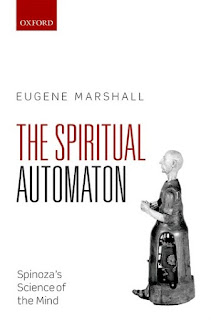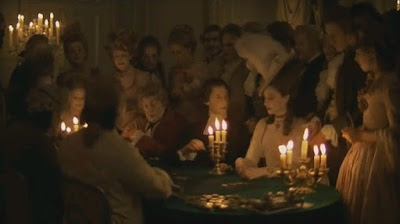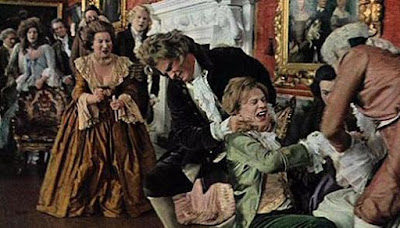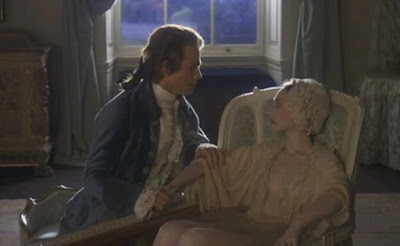 |
| Man in the Universe - a scene from 'Barry Lyndon' (1975). |
How can we understand our
mind through Spinoza’s teaching? Through his metaphysical speculations, Spinoza
went further to provide a mechanistic explanation of the human mind. He
believed that when humans behaved rationally, the mind was a self-directed
mechanism, because the motivation of humanity was self-preservation. Thus, that
is what we mean by ‘selfish’ in the context of Spinoza’s philosophical ideas
(not quite like ‘greedy’). The word Spinoza has used was ‘conatus’, also
important in British philosopher Thomas Hobbes’ philosophy. Conatus can be
defined as the innate inclination of a thing to continue to exist and enhance
itself. In the third section of Ethics, Proposition 6, ‘Each thing, as far as
it lies in itself, strives to persevere in its being.’ So, Spinoza believed
that the ‘will to continue’ is something inside all of us, and it is a force of
Nature to strive and go forward, rather than to perish as ashes.
What makes up our mind are
that of ideas, and due to the chains of causes and effects, these ideas will be
connected as a coherent system, and the result is a mental mechanism present in
our mind. The net result of the action of this mental mechanism leads to
consciousness. Thus, when we are rational, we are like ‘spiritual automatons’,
who work in a mechanistic manner and yet have consciousness, rather than like
philosophical zombies or robots. This is Spinoza’s unique take on psychology.
A particular important view
regarding the philosophy of mind is Spinoza’s monism. In Ethics, Spinoza did
address the ‘Mind-Body Problem’, almost a holy grail for generations of
thinkers. While his predecessor, Descartes, took a dualistic view on the mind
and body problem, stating that they were two separate substances in the world;
Spinoza’s view is known as ‘parallelism’. That suggests mind and body are one
and the same thing, and there is no point to separate them or to argue which
one is truer than the other one. Spinoza believed that the action of the mind
was at the same time with the action of the body – thus parallel in a sense,
and so the modes of mind are isomorphic to modes of body.
I have read a nice analogy
regarding this mind-body issue in another book, ‘Understanding Rationalism’. In
that, the author compares Spinoza’s monism to the development of algebraic
geometry. When you have, for example, the equation of a straight line y = mx +
c, it has a corresponding graph on the Cartesian plane. The equation and the
graph both represent the same thing, so they are one and the same. There is no
point to ask whether the graph is realer – in a metaphysical sense – than the
equation or vice versa. You can say the equation lives in an algebraic world,
and the graph lives in a geometric world, like two parallel universes. Yet the
key point is, they are identical to each other. Indeed, it is rather ironic
that Descartes, which is coined as the father of modern analytic geometry, has
not been able to connect with this rather interesting analogy and instead has proposed
a Dualism in the mind-body problem.
Spinoza has illustrated to
the readers the real face of the universe. Now, how can one live well in this
apparently indifferent universe? Spinoza’s project is to release us from the
imprisonments of false assumptions and mis-conceptions, because these are the
obstacles that will prevent us from living a more fulfilling life. The ultimate
aim of the Spinozistic way is to achieve the intellectual love from God,
meaning that one develops a better understanding of oneself and the relation to
Nature.
Before that, we have to
confront a rather controversial issue - the illusion of free will. This sounds
rather counter-intuitive because, for our experiences, we are often free to
choose, right? Yet, to Spinoza, the mis-conception about the existence of free
will leads to our enslavement and pain. If we are asking the wrong question,
how can we reach an insightful answer? For Spinoza, there simply may not have a
choice between determinism and free will. The sadness we get from our lives is
due to wrong assumptions which are originated from passions – for example,
believing there will be a God who will do us justice. Spinoza stated that if we
wrestled with all these false impressions, we would never achieve a virtuous
life.
Does that mean humanity does
not deserve freedom? Spinoza disagreed. Because for him, freedom took a deeper layer
of meaning. To be free is to be free of the sentiment, false assumptions and
wrong conceptions that will only serve as burdens to one’s way to happiness. To
Spinoza, if one can appreciate the working of Nature and be able to go
naturally with the flow, they will gain an intellectual fulfillment and find
true happiness for their existences. If one can control the passions and view the
Nature with awe, they can still be gratified to see that they are part of an
elegant and wonderful universe. Spinoza’s God will only award those who are
willing to step out from the comfort zone of ignorance and alter their
attitudes to see the real world for themselves.
After all, you do not have to
agree with Spinoza – he was just one of the many wise men who have contributed significantly
to human knowledge. Yet to me, if reading Spinoza will motivate your
inquisitive mind to give some real thoughts about the human condition, then I
suppose he has succeeded.
(2/2)
by Ed Law
17/9/2016










